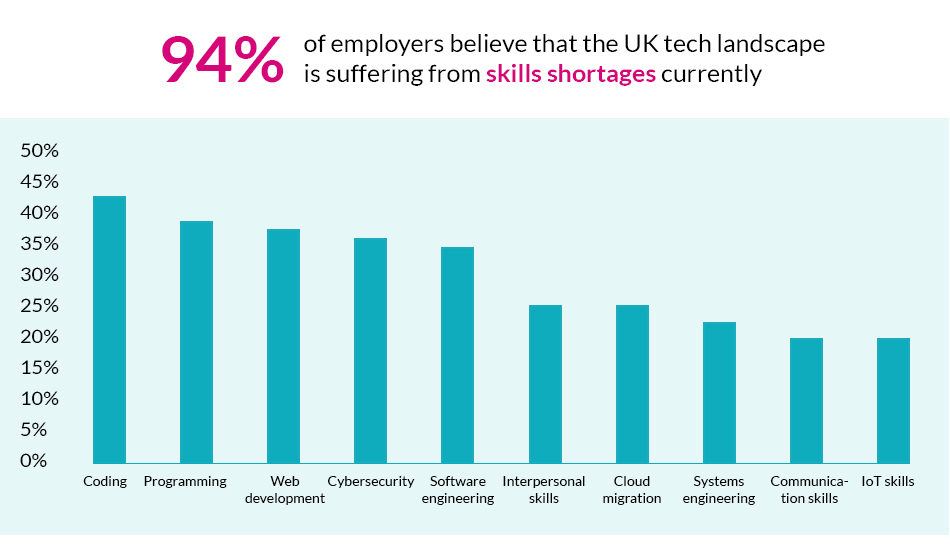Topics: Recruitment, Recruitment Industry News, Recruitment Technology
Posted on February 07, 2020
Written By Aron Vaidya

QX Global Group RPO service division has been working on using RPA to optimise the core business processes and deliver better quality solutions to clients. And while we hear a lot about artificial intelligence, robotics and blockchain applications, we wanted to get a better understanding of these technologies.
And, who better to talk to about leveraging technologies in recruitment than the well-known tech enthusiast Ian Knowlson. With a career spanning over 30 years in the staffing industry, Ian has gained immense recognition as a global influencer, growth coach and an established futurist. He is recognised as one of the Top 10 Global Influencers by Onalytica; a merited credit for his active contribution towards the future of Recruitment industry.
We coordinated with him to set up an interview and focus on covering the below queries:
The 30-minute interview with Ian Knowlson commenced with the following question:
One of the biggest concerns that businesses all over the world are facing since the past 25 years, rising insidiously with time and increased use of technology, is skills shortages.
A couple of decades back, the rate at which vendors released new versions of their applications and software was slow-paced and irregular. Now, they release new versions every 3-6 months. The rate of change has amplified exponentially, and this change of pace is creating big problems for businesses that want to hire and work with the latest skilled engineers.
For instance, you hire a resource with version-1 or version-2 experience, while version-3 is newly released in the market. You set them on a training course, which would take them around six months to step up to the next level.
While this practice was possible earlier; now that the window is shrinking, the change is so fast that by the time the resource is trained for one version, another update(s) will have already taken its place, and the engineer remains unskilled in the latest tech. This skill shortage is a critical problem, especially in the technology industry.
 Credit: Explore Group (2017)
Credit: Explore Group (2017)Consequently, when the new technology comes in, there is a shortage of people required to operate and leverage the power of technology to its full potential. This change is one of the biggest problems that industries across the globe are facing, and this rate of change is not going to slow down; it’ll only get faster from here.
When it comes to staffing in this candidate short market, the resource possessing these skills goes to the highest bidder while the rest struggle. Note that, unlike the old days, the highest bid encompasses not only monetary benefits but also embodies non-transactional engagement and candidate experience.
Let’s look at another factor that highlights the skills shortages in the current landscape.
A practice that’s become a significant part of all industries is the increased use of data; it’s the new oil for businesses! The demand for data specialists is, and will further be, going through the roof. With the leap in digital technology and predictive analytics demand, businesses are keener than ever to hire data analysts, data engineers and other data experts. The demand is high, but is there an adequate supply of relevant resources that can meet this demand?
The current working demographics in numerous developed as well as developing countries, including the UK, USA, Japan, India and Australia, point towards an unfortunate inevitability of severe skills shortages in the next ten years. In the UK, the number of engineers approaching retirement age in the technology sector is quite huge; a great number of them are expected to retire in the next 5 to 10 years.
A shortfall of around 60,000 engineers was estimated in 2013, and there was a need to recruit 60,000 engineers to bridge that gap. This number came from Sir James Dyson, a renowned British inventor. He further added that 26% of graduates do not opt for an engineering career, and 85% of engineering and science postgraduates are from outside the UK, and nine out of 10 students leave the UK after finishing their studies. This challenge was identified in 2013 and has only escalated further with time.

The BREXIT debate has exacerbated this issue further. Of course, the government is planning to invest £100 billion in the next five years on infrastructure, but the question remains, are the resources there to fulfil that?
It will be no different in other countries, whether you consider Germany, India, Australia or entire Europe. This challenge is the canvas upon which all other challenges go!
In the prevailing market scenario, where demand for talent far exceeds the supply, the opportunity is there for the recruitment and RPO agencies to capitalise on the increasing hiring needs.
In the UK market, particularly in the sector with skills shortages, one element that will be a significant differentiator in the next decade is flexible working. The flexible working is basically the flexibility of where I work, when I work, and the conditions I work in. This transformation of the workplace is fundamental to the future of any business.
Moreover, 85% of IT, technology and engineering industries are currently male-dominant. If we want to solve the prevalent skill gap, we need to find a gender balance. Moreover, diversity in the workforce can be achieved by introducing the flexible working practice.

Many capable people sometimes have to drop their career in engineering; for example, women may need to take an extended career break to take care of their children. But if they want to come back after a few years, it becomes a challenge because the technology they thought they’ll be getting back to may not even exist. So, people need to stay connected with their industry sectors, and this can be accomplished by offering them flexibility. The technology to achieve this flexibility is already in place.
I am based in the UK while you are in India, but we are still having this conversation. We can be co-workers and exchange emails, collaborate for a future project or set up a meeting without any constraints of the geography. If we set pre-defined milestones with definite timeline, there will be no need for micro-management or daily reporting calls.
Workplaces need to bring about a significant cultural shift; there needs to be a shift in the management scale. Businesses need to adopt milestone scheduling approach and move towards an outcome-focused work culture. Some big names are already doing this; Cisco, Accenture, IBM, and Deloitte are embracing this philosophy. Cisco was recently named the best company to work in the world.
Now, even though we have the tech to exercise this culture, the baby boomer and gen-x generation is resisting this change. They are afraid to move away from their fundamental and traditional management values for fear of loss of control and inability to deliver because of the shift towards output-focused work approach. They want people to be on their desk on time and work through the hours there. There is also a matter of trust where the fear their employee might spend more time on the golf course than on work. But if we define the processes, outcomes and timelines, does it matter what I am doing as long as I deliver?
The recruitment industry is currently polarised in two different directions. At one end of the spectrum, you have Managed Services which encompasses Recruitment Outsourcing , Managed Service Provider (MSP), Master Vendor, and Neutral Vendor. At the other end of the spectrum, you have Niche Recruiters.
Niche recruiting model features a small recruitment team, consisting of around 20 to 50 recruiters and sourcers, with a dedicated approach towards a specific sector, whether it’s tech, healthcare, engineering or finance. They focus on filling hard-to-fill positions, recruiting rare skilled candidates with expertise in a particular industry. This model aims to exploit the skill gaps (that exists in the UK and other countries) between the demand and supply of resources. Once they find and secure the rare skilled resources, they market them to the highest bidders.
Managed Service Recruiters focus on the opposite end of the spectrum. They deliver high-volume recruiting at a reduced transaction price. Their operating procedure is focused on driving down the delivery costs without compromising on their quality of service and generate profit. They achieve this by leveraging technology in the form of automation and artificial intelligence (AI). While they face competition from client’s in-house HR team and sometimes struggle with TUPE concerning operational staff, they offer a cost-effective solution to clients that require high-volume hiring.
<!–
Refer these two pieces detailing changing landscape of recruitment that shed further light on these models:
–>
Technology is slowly, but surely, disrupting the traditional recruitment world. I was part of a teleconference with IBM last year; I spoke with Dr Nigel Guenole about the use of AI in recruiting. He talked about its use during various phases of the talent acquisition funnel, one of which was the candidate attraction stage and the processing phase of the candidate CV.
I believe that AI, in its current state, is suited for sections where recruiters need to process large scale volume of applications and the skill threshold is quite low. However, we are witnessing the onset of new AI tools that actively participate in candidate sourcing, interviewing, detecting diversity in workforce and processing applications.
Do I see AI improving productivity in the RPO space? Yes, I do. I had collaborated recently with a major banking client in London on a specific project some time back. This bank was working with one of the world’s leading RPO firms at the time to manage the recruitment of staff in London and various other sites across the UK. They had a very efficient process in place to streamline and manage the talent acquisition process.
They used artificial intelligence throughout numerous phases of the funnel; to attract candidates, to process applications, and to use Killer Questions to weed out weak applications. This implementation increased the productivity of the recruitment management team, enabling them to get a better handle on managing a large number of applications.

The tech is available in the market to automate application processing. Does it work? Yes, but, it only works – and this is a critical point – when the demand for job positions is immense, and where the number of applications is massive. It works in a space where one can afford to be less selective; it’s ideal for the RPO model. However, where it won’t work is the niche recruiting model.
If you want to hire a top Python developer or someone skilled in RPA, and there are only 100 of them available in London. If you send 20 killer questions to them, they’ll answer one question and leave. They will not jump through these hoops for you. Twenty years back, we used to follow the same technique; candidates would apply for a job, we’d send them a questionnaire, we’d assess their response, and pick the most appropriate lot for the interview. This practice didn’t work for the niche-skilled applicants two decades back either. All we’ve done is automate the same process, and it still doesn’t work for niche recruiting model today.
To answer your question, AI is still around 5 to 10 years away from making a significant impact on the quality of application processing practice. The theory is there, but we’ll need to wait for it to be applied successfully across the staffing landscape. That being said, IBM has already started using AI tech to optimise application process with few clients since the last year. So, yes, if used correctly, it can improve the productivity of a recruiting team.
Candidate sourcing requires a persuasive conversation and, at the moment, what artificial intelligence can’t do is have a persuasive conversation. It lacks the emotional intelligence needed to pull it off.

If I want you to move from India and work with me in London, or if I want to deploy a team in Mumbai from London, then I have to use my persuasive skills. It is an art that I have mastered with over 30 years of experience; it’s not something a computer can do just yet.
When I persuade you to leave India, there will be an emotional element attached to your decision making, which may not be logical. I need to read your body language, listen to the tone of your voice and ascertain how interested you are in moving to London. I do believe that in the next two decades, we will be able to train the artificial intelligence machines to support me, but, for now, it is my skill, guile, and emotional intelligence that I am using to persuade you to make a decision.
And, on that note, unfortunately, we had to bid each other goodbye. Ian had a long day planned; but before he left, he painted a clear picture of realities of the recruitment industry and provided us with crucial insights on the application of technology, especially AI, in recruitment.
We look forward to collaborating with Ian again in the near future and present you with his knowledge about tech in the staffing landscape.
Originally published Feb 07, 2020 12:02:52, updated Mar 04 2025
Topics: Recruitment, Recruitment Industry News, Recruitment Technology